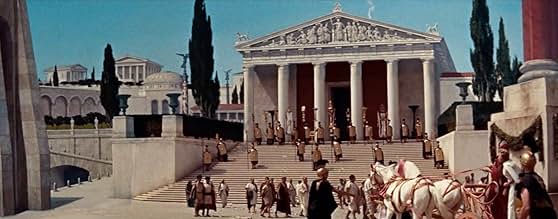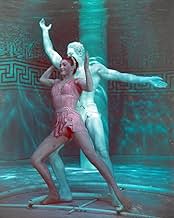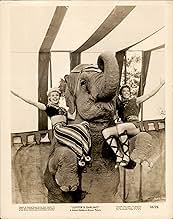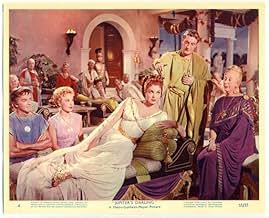NOTE IMDb
5,7/10
748
MA NOTE
Pour sauver la cité de Rome, menacée par les troupes d'Hannibal, la belle Amytis séduit le général carthaginois.Pour sauver la cité de Rome, menacée par les troupes d'Hannibal, la belle Amytis séduit le général carthaginois.Pour sauver la cité de Rome, menacée par les troupes d'Hannibal, la belle Amytis séduit le général carthaginois.
- Réalisation
- Scénario
- Casting principal
Chris Alcaide
- Cpl. Ballol
- (non crédité)
Fred Aldrich
- Soldier
- (non crédité)
Herman Belmonte
- Citizen
- (non crédité)
Ray Beltram
- Slave
- (non crédité)
Stanley Blystone
- Citizen
- (non crédité)
Avis à la une
Esther Williams' swan song at MGM is also her final aquatic musical. Less significantly, it's also the last (and best) of the three movies Esther did with Howard Keel. It's a movie that takes place in ancient Rome where Esther plays Amytis, the object of affection for Roman ruler Fabius (George Sanders). Fabius is anticipating an attack on Rome from the famous military commander Hannibal (a bearded Howard Keel). When Hannibal meets Amytis, she tries to use her feminine charms to persuade him not to attack.
It's a silly movie but an enjoyable one that is better than its reputation suggests. The sets and costumes are all colorful and bright, though some today might find it all a bit corny. Esther is fit and gorgeous (those legs!) with a lovely underwater swimming number where she 'dances' with statues that come to life. A real classic and the highlight of the film. She does well in the romantic scenes with Howard Keel, who sings some forgettable tunes. I especially liked that Esther's character was so sexy and fun. Of the three films Keel and Esther did together, this is the one where they have the best chemistry. The cast backing up the leads is solid. George Sanders plays Fabius with as much seriousness as he can muster considering how silly the whole thing must have seemed to him. Richard Hayden is oddly enjoyable as the singing storyteller Horatio. Others in the cast include William Demarest, Douglas Dumbrille, Michael Ansara, and dancing couple Gower & Marge Champion. The Champions perform the "If This Be Slavery" number ("Hooray for slavery!"), which has some lyrics that are funny when taken out of context. Most of the songs and dance numbers are nothing to write home about but none are terrible. Anything with Esther is worth seeing just for her smile...and those legs!
It's a silly movie but an enjoyable one that is better than its reputation suggests. The sets and costumes are all colorful and bright, though some today might find it all a bit corny. Esther is fit and gorgeous (those legs!) with a lovely underwater swimming number where she 'dances' with statues that come to life. A real classic and the highlight of the film. She does well in the romantic scenes with Howard Keel, who sings some forgettable tunes. I especially liked that Esther's character was so sexy and fun. Of the three films Keel and Esther did together, this is the one where they have the best chemistry. The cast backing up the leads is solid. George Sanders plays Fabius with as much seriousness as he can muster considering how silly the whole thing must have seemed to him. Richard Hayden is oddly enjoyable as the singing storyteller Horatio. Others in the cast include William Demarest, Douglas Dumbrille, Michael Ansara, and dancing couple Gower & Marge Champion. The Champions perform the "If This Be Slavery" number ("Hooray for slavery!"), which has some lyrics that are funny when taken out of context. Most of the songs and dance numbers are nothing to write home about but none are terrible. Anything with Esther is worth seeing just for her smile...and those legs!
Enormous in scope and production with elephants, horses, and a cast of thousands of costumed, weaponized extras, this picture is a cute diversion for an hour and a half. Esther Williams is downright gorgeous, period. The superbly dependable Howard Keel didn't have to visit the cafeteria, inasmuch as he spent the whole picture chewing the scenery. The battle scenes were well-shot, the humor and 1955ish lust delightfully presented. The Champions deliver their usual athletic dence routines to witty choreography by Hermes Pan.
Unfortunately, the lyrics of the infrequent songs are abysmal, probably the result of a competition MGM sponsored for high school students. Fortunately, the tuneless, unmemorable music for these songs stoops to the level of the words.
Still, just to catch an eyeful of the well-put-together Ms. Williams and Mr. Keel make this a pleasant way to kill an hour and a half.
A legendary MGM flop, one of the big musicals reputed to have helped kill off big musicals. And it's pretty silly in spots, with a buff Gower Champion singing lyrics like "If this be slavery/ I don't want to be free!" and song-and-dance cues arriving perfunctorily. But it's also an enterprising effort at keeping a dying genre alive, with plenty of sung-lyric exposition by Richard Haydn as a bewildered historian, and more plot-song integration than most MGM musicals attempted. It's also sexier than the average musical, quite frank about why Hannibal kept delaying his attack on Rome, and with plenty of chemistry between Esther Williams and Howard Keel in the main plot and the Champions as the secondary, comic-relief couple. The Burton Lane-Harold Adamson songs aren't great, but they aren't terrible, and for such a huge production, it's surprisingly light on its feet and irreverent. There's a fairly exciting, well-edited chase-through-the-water climax, and if Dorothy Kingsley's screenplay doesn't achieve the Shavian heights it's attempting to scale, it's smarter than most musical screenplays of the day. The wide screen is well filled, and the thing moves quickly. Well worth a look.
Esther Williams, Howard Keel, and husband-and-wife dancing team Marge and Gower Champion star in this musical about Hannibal. I went into this a little wary, but wanted to see one of Esther's lesser-known films. Granted, it may have earned a somewhat campy and corny reputation, but I found as I got deeper and deeper into it, that I really enjoyed it. What's a little ingenious about it, is that they worked in an Esther Williams swimming interlude in a dramatic way, as she is being chased. And, the great supporting cast of George Sanders, William Demarest, Douglas Dumbrille and Richard Haydn helps a lot. And, both Howard Keel and Esther are very believable as these mythological characters, she so beautiful and he so big, virile, and commanding. This is the type of film, that one will have the dialogue and especially the songs memorized from watching this over and over, because it's so much of a guilty pleasure. I definitely am going to see this again soon. I was going to give this a seven, given the fact this isn't one of Esther's top successes, but it's just so enjoyable, that I give it an '8.' After all, who cares what movie critics think? Just sit back and enjoy the histrionics of Hannibal and Amytis. By the way, do you think this is accurate?
'Jupiter's Darling' had so much going for it. Who cannot resist a cast with the likes of Esther Williams, Howard Keel, George Sanders and Marge and Gower Champion, and that it was directed by George Sidney, who made a number of great films.
It is a shame that 'Jupiter's Darling' wasn't better than it was. By all means, it is not a terrible film and not as bad as its notorious financial flop suggests. It does have many pleasures and the reasons for seeing the film in the first place come off well. This said, all have done much better, despite loving Keel and Sanders to death 'Jupiter's Darling' was seen as someone in the process of watching and reviewing every Esther Williams musical and it is one of my least favourite of hers along with 'Texas Carnival'.
Williams certainly isn't one of the problems, in fact she is in her serenely beautiful Amazonian prime and her aquatic skills second to none and the envy of many. Neither is Keel, who is masculine, commanding and charismatic and sings with his usual warm beauty and robust brio, especially in "Never Let the Night Get Away" where he is quite touching. The two click together superbly. Sanders is his usual suave and smooth self, yes even in a role pretty far removed from the types he excelled at (villains and cads), while Richard Haydn is amusing and Marge and Gower Champion are a delight.
That's not all though. The highlight is the truly spectacular water ballet in "I Had a Dream", one of Williams' best and most visually stunning water ballets. The chase sequence is also impressive. Marge and Gower Champion have two notable song and dance numbers and do a terrific job with both. "Life of an Elephant", which sees them dancing with painted elephants, is to be seen to be believed, though some may prefer the more energetic and less lengthy "If This Be Slavery".
Visually, 'Jupiter's Darling' is the very meaning of lavish, the use of CinemaScope, rich bold colours and inventive use of wide-screen are just exemplary, "I Had a Dream" being the standout in this regard. The costumes and sets are very handsome too.
However, the songs and score are only at best serviceable and generally forgettably substandard, the rousing "Hannibal's Victory March" and the touching "Never Let the Night Get Away" being exceptions. The rest have not-easy-to-remember melodies and sometimes very silly lyrics, some like in "Never Trust a Woman" being questionable. Choreographically, "I Had a Dream" and the Champions' numbers impress but the rest lumber and look under-rehearsed.
Storytelling is uneven, sometimes it moves quickly and has great energy but other parts are ponderous, and there is a sense that the film was trying to mix too many styles and genres and it never quite came together. Worst of all is the script, which is impossible to take seriously even in moments that are meant to be serious and even when you are taking the film for what it is, if Keel and Sanders really did have the giggles during filming that's hardly surprising. Sidney's direction is competent but uninspired.
Overall, difficult to rate but with enough pleasures to make it watchable. 5/10 Bethany Cox
It is a shame that 'Jupiter's Darling' wasn't better than it was. By all means, it is not a terrible film and not as bad as its notorious financial flop suggests. It does have many pleasures and the reasons for seeing the film in the first place come off well. This said, all have done much better, despite loving Keel and Sanders to death 'Jupiter's Darling' was seen as someone in the process of watching and reviewing every Esther Williams musical and it is one of my least favourite of hers along with 'Texas Carnival'.
Williams certainly isn't one of the problems, in fact she is in her serenely beautiful Amazonian prime and her aquatic skills second to none and the envy of many. Neither is Keel, who is masculine, commanding and charismatic and sings with his usual warm beauty and robust brio, especially in "Never Let the Night Get Away" where he is quite touching. The two click together superbly. Sanders is his usual suave and smooth self, yes even in a role pretty far removed from the types he excelled at (villains and cads), while Richard Haydn is amusing and Marge and Gower Champion are a delight.
That's not all though. The highlight is the truly spectacular water ballet in "I Had a Dream", one of Williams' best and most visually stunning water ballets. The chase sequence is also impressive. Marge and Gower Champion have two notable song and dance numbers and do a terrific job with both. "Life of an Elephant", which sees them dancing with painted elephants, is to be seen to be believed, though some may prefer the more energetic and less lengthy "If This Be Slavery".
Visually, 'Jupiter's Darling' is the very meaning of lavish, the use of CinemaScope, rich bold colours and inventive use of wide-screen are just exemplary, "I Had a Dream" being the standout in this regard. The costumes and sets are very handsome too.
However, the songs and score are only at best serviceable and generally forgettably substandard, the rousing "Hannibal's Victory March" and the touching "Never Let the Night Get Away" being exceptions. The rest have not-easy-to-remember melodies and sometimes very silly lyrics, some like in "Never Trust a Woman" being questionable. Choreographically, "I Had a Dream" and the Champions' numbers impress but the rest lumber and look under-rehearsed.
Storytelling is uneven, sometimes it moves quickly and has great energy but other parts are ponderous, and there is a sense that the film was trying to mix too many styles and genres and it never quite came together. Worst of all is the script, which is impossible to take seriously even in moments that are meant to be serious and even when you are taking the film for what it is, if Keel and Sanders really did have the giggles during filming that's hardly surprising. Sidney's direction is competent but uninspired.
Overall, difficult to rate but with enough pleasures to make it watchable. 5/10 Bethany Cox
Le saviez-vous
- AnecdotesWilliams refused to do the scene where Amytis rides a horse off a cliff and MGM refused to cut the scene. Platform diver Al Lewin did the stunt in one take - and broke his back in the process.
- GaffesDuring the "slave market" dance number Marge Champion at one point has a small basket on her head. It falls off and lands on the ground between her and Gower. They pull in for a closeup and when they pull back the basket is gone.
- Crédits fousIn opening credits: "In 216 B.C., Hannibal the Barbarian marched on Rome. The history of this great march has always been confused. This picture will do nothing to clear it up."
- ConnexionsFeatured in 1955 Motion Picture Theatre Celebration (1955)
- Bandes originalesHoratio's Narration
(uncredited)
Music by Saul Chaplin
Lyrics by George Wells, Harold Adamson and Saul Chaplin
Sung by Richard Haydn
Meilleurs choix
Connectez-vous pour évaluer et suivre la liste de favoris afin de recevoir des recommandations personnalisées
- How long is Jupiter's Darling?Alimenté par Alexa
Détails
Box-office
- Budget
- 3 337 000 $US (estimé)
- Durée
- 1h 35min(95 min)
- Rapport de forme
- 2.55 : 1
Contribuer à cette page
Suggérer une modification ou ajouter du contenu manquant























